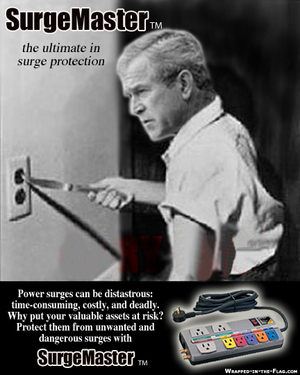
America must be victorious, but victory is out of the question. This is the election-year paradox facing voters. Assuming Obama’s delegate count surge continues through Texas and Ohio, the national campaign will bring the surge issue front and center in the race to replace Mr. Bush, the president who started a war he cannot finish. On the Republican side, John McCain’s resurrected political fortunes will pit the man who believes he has fixed the mopping-up problem in Iraq against the man who can claim in all innocence that he was against the Iraq war from the start. Both candidates support the troops and respect General Petraeus, who came close to being Time Magazine‘s “Person of the Year.” Either McCain or Obama may grace a future cover of Time as the man who ended the war that no one no longer wants but no one also wants to lose. But this is as unpredictable as the eventual success of the “surge” as a strategy to bring about a stable Iraq.
About that surge… Republicans in the main see it as working; democrats tend to see the whole war as a unilaterally Bush diversion from the real terrorists and the surge as a desperate ploy for time, too little and too late. So is the surge working? No one can deny the obvious: since we pumped an extra 30,000 American troops onto the ground and now use them more effectively so that they are not as vulnerable to suicide attacks, less soldiers are dying. But there are still casualties. As of February 24, the official DOD count of reported U.S. military deaths stood at 3972. Earlier today an Iraqi Brigadier General was killed in a suicide attack. Yesterday at least 63 Shi’a pilgrims were blown away south of Baghdad while on their way to Kerbala. Another Iraqi Tribal leader who was working with the U. S. forces was killed. Turkish forces continue to attack Kurdish rebels inside Iraq. Then there are the daily plebian cases which do not make the news, only grieve families and neighbors. For these who just died the surge is not working, for the Iraqis and Americans who will die in the future the surge will not have worked.
For the foreseeable future, all the surge can do is buy time, a bandage for the gaping hole in the body politic of the Iraqi government until negotiated surgery can be done. It is not clear who is the surgeon? Mr. Maliki does not have a track record of successful diplomatic efforts thus far. Are we asking for a peace donor transplant which is currently not available. By most accounts, the Iraqi government is not much closer to resolving internal divisions and maintaining security than before the surge. The surge strategy may be a political football for the presidential candidates, but in big games even the best players fumble. Or as General Patraeus recently put it:
“There have been significant steps forward. There’s been quite a bit of progress against al Qaeda in Iraq and against other extremist elements,” said Gen. David Petraeus, the top U.S. military commander in Iraq, speaking in an interview last week with a radio station.
“But having said all that, again I want to be very cautious upfront and note that there’s nobody here doing victory dances in the end zone or talking about ‘turning the corner’ or ‘seeing lights at the end of the tunnel,’ ” Petraeus said. “There’s still a lot of hard work still to be done.”
In football there are rules, one of which is four downs and you are out. Even the mighty Patriot quarterback Tom Brady fell victim to that. This election is about what to do on fourth down, whether it is inches or yards. We will have to wait until the fall season to find out what specific fourth down plays will work. Meanwhile the death toll mounts, even if in surge reduced spurts.
Daniel Martin Varisco